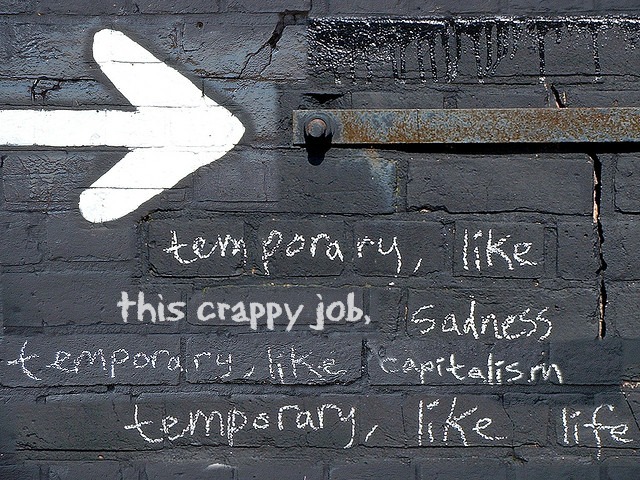This month’s JAVMA features confirmation of what those of us in the profession for more than a year or two already suspected: veterinarians are a sad bunch, compared to the general population. Consider these stats from the CDC’s first-ever survey of the veterinary population:
- 1 in 6 have considered suicide;
- 25% of men and 37% of women in the profession report depressive episodes;
- 1.1% of men and 1.4% of women have attempted suicide;
That last stat is the only one where vets figure in below the national mean, but before you cheer consider this: it’s because more veterinarians successfully complete suicide.
This preliminary data doesn’t delve into the causes or the proposed solutions, though those are currently hotly debated. Nonetheless, it’s good to see on paper what so many who are struggling have needed to hear: You’re not alone.
Stayin’ Alive
After watching my Ignite talk on being a Death Fairy, a veterinarian asked me how I avoided compassion fatigue in my work. I told her I would answer that, but first I have to admit this:
For a long time, I didn’t avoid it at all. I didn’t just float out of vet school and find an amazing job and love every second and plan to be a hospice vet because I knew that was the right thing for me to be. I wish I could tell you I was that organized and thoughtful, but the truth be told I did what most people I know in this field do when they’re stressed: power through bad situations until they became untenable, taking on more responsibility every other second.
So no, I didn’t avoid compassion fatigue. In fact, I burned out and quit. But then I reincarnated, I guess you could say, with a lot more perspective and a healthy understanding of what I’m really supposed to be doing here. But not until after I got really sick, like going to specialists and talking about scary tests sick, did I decide to get my priorities in order. Once that got sorted out, life got really good!
How to be a zen vet in a Prozac profession
1. Don’t underestimate the importance of your co-workers
I think there is no greater indicator of how happy you will be at work than how well your team works together. They will prop you up when you’re down, have your back when things get nuts, and inspire you to do better every day. Unfortunately, the converse is also true. The saying “turd in the punchbowl” exists for a reason.
2. Don’t settle for a toxic environment.

Sometimes you think you’re starting in at the best place on the earth, but something happens. The office manager is stealing. Your mentor turns out to be Voldemort. You get pregnant and can’t work overnights anymore. So many people stick it out in a bad situation because 1) we’re taught not to whine and 2) we’re scared there’s nothing better out there.
There’s always something better out there, but you won’t find it if you don’t look. If you are in an office that is causing you physical symptoms of anxiety, it’s time to start looking for a new job. Living in modern day American comes with certain advantages, like the whole “no indentured servitude” thing.
3. Don’t be afraid to explore.
I had no intention of being a veterinary writer. Blogs didn’t exist when I started vet school, nor did hospice veterinarians. Sometimes you just have to strike out in a direction that looks good and see what’s out there. Because guess what? I don’t care what anyone else has told you, you’re allowed to come back and be a vet if you leave. Taking time off to explore another career, take care of family, get another degree, none of it is a one way valve- unless you want it to be.
4. Set boundaries. Mean it.
Out of every rule I laid out, this is seriously the number one important one. With the exception of the rare shining star who really does want this to be their life, most of us want a life of which veterinary medicine is only a part. This is a profession where it is very easy for it to take over your life, because there will always be more asked of you than you are able to give. Always. It is not a failing to recognize that.
Set boundaries with your clients, your co-workers, and yourself. Take vacations. Exercise. Enjoy your family. Do not let work intrude on this or else you will begin to resent it, and that is the seed of burnout. You can (and should) work your butt off, then go home and play your butt off.
Set those boundaries, and enforce them like your life depends on it.

It was an ironic realization to figure out that point of diminishing returns in terms of giving of yourself. You cannot truly understand compassion unless you’re willing to extend it to everyone, including yourself.
Resources
AVMA list of Wellness Resources
National Suicide Prevention Hotline
A place to talk to other vets- I am aware of several online and Facebook groups for vets to talk and support one another. Feel free to reach out to me if you would like more information.









Great advice and applicable to every profession. You are the most inspirational Death Fairy I have ever met!
boundaries…. they’re what’s for dinner…. or something like that; being in the pediatric world, it is the same. I lost my boundaries, quit b/c I couldn’t hack it but came back with boundaries without losing compassion. It is a fine balance and one to regularly check in with. B/c there is that tendency to get too cynical and not care anymore and that is not a good place. I work in a regional NICU so it gets crazy at times.
Once again, so glad you are able to put into words what so many feel!
GREAT article! As a recovering ER veterinarian, burnout is a big problem. As is compassion fatigue, as ER vets do a lot of euthanasias. 🙁
Love the blog!